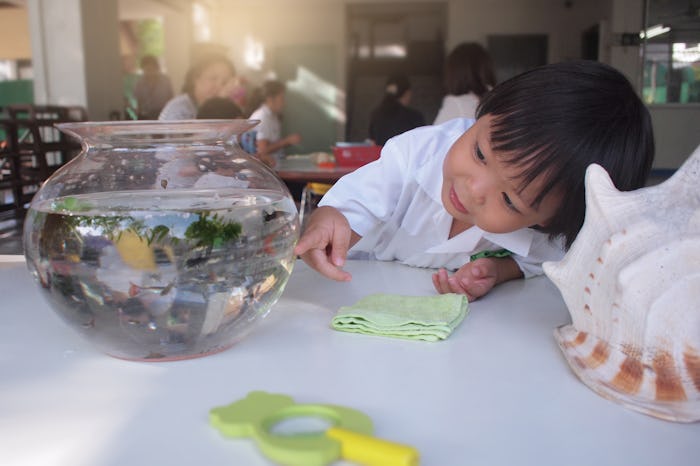Life

Is It Better To Tell Your Kid Their Fish Died Or Secretly Replace It?
Over Christmas break my in-laws watched our dog. While recapping their pet-sitting experience, my aunt-in-law mentioned that one day our pup tripped down the stairs. My 4-year-old burst into tears. “Trigger’s dead?” he cried. It took 15 minutes of reassurance that Trigger was still very much alive to calm our boy down. But what should parents say when a pet actually does pass? Should you tell a kid their fish died or secretly replace it?
Fortunately, many authors have tackled this tough topic and there are plenty of books on the subject. Just search “how to talk to kids about death” on Amazon. But if you just found Dory dead in the fishbowl and need some answers now, Anne C. Frazier, a Licensed Professional Counselor, has some suggestions.
First off, Frazier tells Romper that by the age of 4, children can understand the finality of death. “However, every child is different and it’s important to take into consideration the developmental, social, and cognitive abilities of your child when presenting the topic of death in conversation,” she says.
But even in light of this fact, it’s Frazier’s opinion that parents should always shoot for thoughtful honesty. “As tempting as it is to avoid tough conversations, it’s important to ask yourself why you are avoiding them. Does the avoidance serve you or your child? If you choose to flush and replace, you are not a bad parent. But, I do think you are missing an important opportunity. You are missing the opportunity to have an important conversation about an inevitable part of life: death,“ Frazier tells Romper.
Instead, set aside your own discomfort. “Choose to empathize and empower and not to rescue them out of that sadness too quickly but rather create a safe space to really feel that emotion, we have done them a far greater service in the long run,” she adds.
You’ll be teaching your child a greater lesson in the process, that death is an inevitable part of life. It doesn’t matter if it’s a pet or a grandparent. Frazier encourages parents to “make space and time for whatever reaction the child might have.” That doesn’t mean in the car on a 10 minute drive to soccer practice, she cautions. Rather, give yourself enough time to come to grips with the fact that it’s “perfectly acceptable to model the expression of sadness for our children." That includes letting your own tears flow in front of your kid.
"Our children need to see our humanness. It reminds them to be more accepting and loving of their own. It also allows them to practice authentic expression of emotion,” says Frazier. “The strongest of people feel sadness and keeping emotion bottled up inside is not healthy. We do not need to shield them from our emotional experiences. Life is full of them. However, make sure you are not implicitly asking your child to take care of you in the moment. You can be sad too, but you are the grown-up and it’s your job to take care of your child.”
So how can you make this tricky process as peaceful as possible? Frazier has a few tips for Romper readers.
- Provide a safe and loving space for a child to express sadness, anger, or confusion about the death. Some kids will have questions and it is perfectly okay not to have all the answers.
- Minimize any expectations. By that Frazier means that parents should be prepared that some kids may have very little reaction to the death of a pet and others may be devastated.
- Collect yourself first. “Awareness of your own feelings on the subject is always a great first step,” she says. “Talk through it with your spouse, or trusted friend first, then trust that you are a good parent, perfectly capable of creating a safe space for a potentially emotional conversation about an inevitable part of life.”
- Make the conversation a beautiful farewell. Frazier suggests asking the kids to each say something special about the pet and allowing them to say goodbye. “They could write something and bury the paper with them or say something out loud at a funeral service of some type that the kids create with your help."
Remember, she says: “Goodbyes are important.”
Expert:
Anne C. Frazier, M.A., Licensed Professional Counselor
This article was originally published on